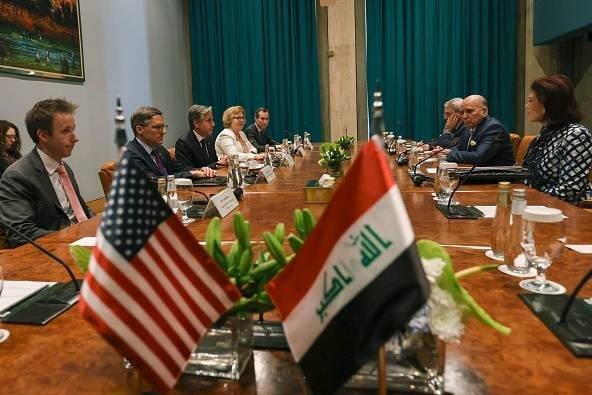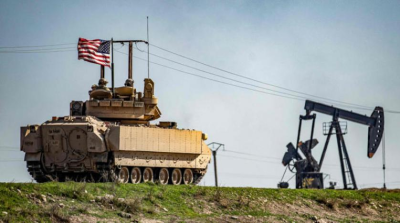NOVANEWS
This comes as US Defense Secretary James “Mad Dog” Mattis defies statements by Donald Trump and tells Congress that Iran is in compliance with the JCPOA.

Turkey’s President Recep Tayyip Erdogan has just concluded a press conference with Iranian President Hassan Rouhani in the Iranian capital, Tehran.
Both leaders stated that they are firmly committed to the territorial unity of Iraq and also Syria, in the wake of the unilateral secessionist referendum in northern Iraq. While Rouhani called regional Kurds “brothers”, each said that dialogue with legitimate central governments is the only way forward, thus echoing calls of the wider international community, with the exception of Israel whose leaders support Kurdish secession.
Both Presidents also affirmed their commitment to expand growing economic ties, while speaking positively about the Astana peace process for Syria in which Russia, Iran and Turkey have worked jointly to create de-escalation zones in Syria, each of which has also been approved by the Syrian government.
Today’s successful meeting is a further sign of Turkey’s pivot towards fellow Eurasian powers and away from NATO, in spite of Ankara’s continued, however uneasy membership of the US led alliance. It also represents a commitment from the two largest non-Arab powers in the Middle East towards preserving the unity and integrity of Arab states whose borders are under threat from Kurdish secessionist movements.
Over the last several months, America’s traditional ally Turkey and its post-1979 adversary Iran have been taking meaningful steps to enhance bilateral cooperation. In August of this year, Iran’s most senior military General, Mohammad Baqeri visited President Erdogan in Ankara.
Since then, Turkey and Iran have cooperated on a border wall between the two countries aimed at cutting off Kurdish militant groups from supplying arms across states. In the last weeks, both Iran and Turkey have been conducting joint military exercises with the Iraqi army in areas which border Iraq’s Kurdish region.
While the US and Israel continue to use proxy wars and hybrid conflicts to foment ideological discord in the Middle East, Turkey and Iran’s relationship is increasingly one of pragmatic mutual self-interest.
As I wrote recently in The Duran,
“Turkey’s relationship with Iran is built on mutual economic benefits, geo-political realism, petro-politics and the need to intensify regional cooperation in preparation for the arrival of One Belt–One Road in the Middle East. Turkey is no more ideologically in-line with Iran than Russia is. Each country has a completely different state ideology and if anything, were Erdogan to fully bring Sunni Islamism to the front and centre of formerly secular Turkey, this will actually mean that Turkey will be even more ideologically different from Iran vis-a-vis a more religiously neutral Kemalist state.
Erdogan is ultimately not an ideologue, even though his language might often obscure such a fact. Erdogan is actually a pragmatist with a very loud and sometimes loose tongue. Erdogan is a man whose co-opting of Turkish civil society ought to read as a master text for leaders looking to consolidate their rule, gradually remove or placate opponents and remake civil institutions to work in one’s personal favour. Few could pull such a thing off and no Turkish leader since Ataturk has made such a profound mark on the Turkish state.
Likewise, Erdogan’s geo-politics is equally pragmatic. Erdogan has not distanced himself from NATO, the US and EU because of some desire to join ‘club Eurasia’. He has become part of ‘club Eurasia’ because he realised that this will be to Turkey’s economic benefit and that Russia and Iran are more easy to work with than the EU. The contest between an increasingly closed and economically retarded EU and China’s One Belt–One Road, which in any case will still give Turkey access to the EU through the backdoor, was not a matter of ideology, it was a matter of obvious self-interest.
Furthermore, even Erdogan’s decision to quietly shift from a position of ‘Assad must go’ to working in the Astana group and tacitly conceding that the Ba’ath party will remain in power in Damascus is a totally pragmatic move.
Erdogan switched teams in order to join the winning side in respect of Syria. He thought he’d be able to get a piece of the Syrian pie by calling for regime change and now that he’s sensed that no regime change will occur, he’s increasingly linking himself with Russia and Iran as a ‘master peacemaker’ even though in this respect, Russia is doing most of the heavy lifting.
Here too Erodgan in exiting from the US camp over Syria , he has likewise exited the Israeli camp, though not for ideological reasons”.
While the US rings its hands over how to handle its balancing act between Baghdad the Iraqi Kurds, Turkey and Iran are bolstering Baghdad’s position and by extrapolation that of Damascus, in taking matters into their own hands.
It is also noteworthy that shortly before Erdogan’s meeting with Rouhani, US Defense Secretary James “Mad Dog” Mattis offered a statement which seemingly defies Donald Trump’s view that the JCPOA (aka the Iran nuclear deal) is an “embarrassment” to the United States.
Mattis took a contrary view, stating,
“I believe that they [Iran] fundamentally are [in compliance]. There have been certainly some areas where they were not temporarily in that regard, but overall our intelligence community believes that they have been compliant and the IAEA [International Atomic Energy Agency] also says so.
The point I would make is that if we can confirm that Iran is living by the agreement, if we can determine that this is in our best interest, then clearly we should stay with it. I believe at this point in time, absent indications to the contrary, it is something that the president should consider staying with”.
The statement from Mattis was echoed by the Chairman of the Joint Chiefs of Staff, General John Dunford. This demonstrates that the Pentagon has taken a far more moderate view on Iran than that of the US President. This moderate view is one that is officially shared by the United Nations, the US State Department and to all other parties who signed the JCPOA, including the European Union, Russia and China.
This apparent discrepancy between the Pentagon and White House in respect of Iran, mirrors a recent Twitter row Donald Trump had with Secretary of State Rex Tillerson. After Tillerson told journalists that the US maintains basic contacts with North Korea, Donald Trump Tweeted that such attempts at diplomacy were useless. It is still not clear if this is a ‘good cop–bad cop’ strategy or if the Trump administration is simply a rudderless ship.
In this sense, President Rouhani’s approach which is centred around not actively countering US rhetoric, but instead allowing pragmatic realities to move at a faster pace than US rhetoric, appears to have paid off.
Now, even the arguably most important member of the Trump administration, General Mattis is conceding that Iran is in full compliance with the JCPOA. Furthermore, in Turkey’s turn towards Iran and Russia, the US has effectively lost control over its largest Middle Eastern ally. Turkey is now pursuing an independent foreign policy and business strategy in which Iran, Russia and China will ultimately be of far more use to Ankara than the EU or Washington.



